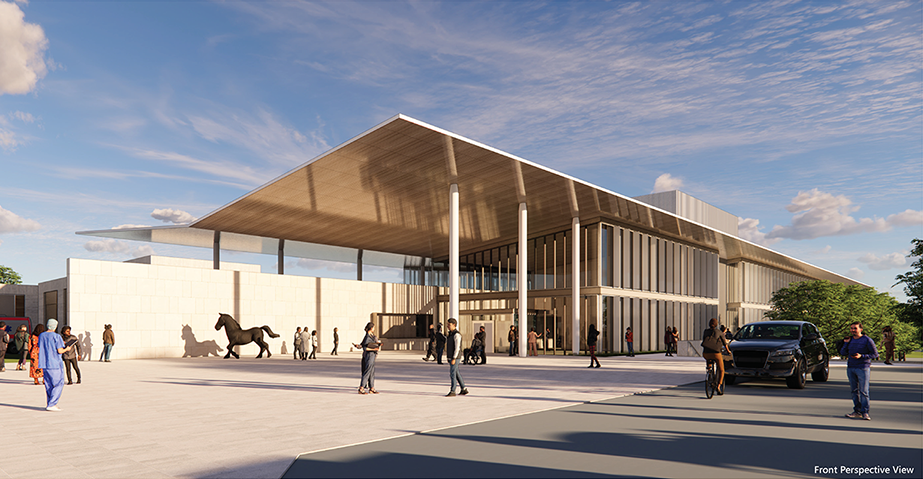County Magazine | May 06, 2025
Expanding mental health care brings hope to Texas
New hospitals in the works to treat mental health patients

A mental health crisis looms over the Panhandle like dust on a warm spring day — persistent, suffocating and impossible to ignore. In this often isolated and overlooked region, residents too are feeling ignored, carrying the same heavy burdens as the land itself.
Health care shortages and economic instability — ranging from the boomand-bust cycles of petroleum and agriculture to the struggles of small businesses — fuel rising substance abuse and emotional distress. With the critical shortage of mental health beds and the region’s remoteness forcing many to travel hundreds of miles for care, those in crisis are often left with nowhere to turn.
In recent years, local officials and lawmakers have championed efforts to address these challenges. The 88th Legislature allocated $11.6 billion to strengthen mental health services statewide, including funding for workforce development and treatment facilities. Key priorities included addressing veterans’ mental health, combating opioid-related drug abuse, and expanding Mental Health First Aid training to equip first responders, educators and military personnel with the tools to recognize and respond to crises.
“As I traveled rural Texas last year, I listened closely as Texans … explained the need for improved mental health care access,” said Lt. Gov. Dan Patrick during the unanimous passage of the legislation. “This investment is a responsible use of our unprecedented budget surplus, and I am proud that the Senate has come together as one to support this important and historic endeavor.”
Crisis in the Panhandle
Potter County Judge Nancy Tanner is one of those who called on Patrick to address the urgent need for change, emphasizing the dire situation in the Panhandle. She has witnessed firsthand the mounting struggles of her residents. In addition to grappling with economic challenges and the lingering impact of the COVID-19 pandemic, her community has faced a relentless series of natural disasters in recent years — tornadoes, wildfires, severe flooding — each compounding the region’s existing hardships.
“I can honestly tell you that the area we live in is not getting any better,” Tanner said. “It’s a continuation of what was going on 20 and 30 years ago. Nothing has changed, because every time I sign an order for someone to go to the state hospital, there’s never a bed.”
As the official overseeing mental health services for all 25 counties in the Panhandle, Tanner often must send residents to Wichita Falls, the nearest place with a mental health hospital, hundreds of miles away. That effort takes a toll, she said, requiring an entire day of travel time and two sheriff’s deputies to transport a single patient. That’s only if there is a bed, though.
For the most part, Tanner and her team manage care within their own hospital, she said.
“They take the medicine for a while, and then they get off their medications when they go home, and then they re-cycle, and they come back with the same issues,” Potter said. “We start over again, and it’s the same thing. There’s no beds … They get tired of it, and they say, ‘You know what? I’ll just go back to my usual life. I like it like that.’”
She expects that with the expansion efforts underway, the story could soon take a different turn for many.
Expanding resources to meet rising demand
Currently, 12 new hospitals or expansions are either in the planning phase or under construction across Texas. These projects include a new $159 million, 75-bed hospital in Amarillo; a $50 million expansion of the El Paso Psychiatric Center by 50 non-maximum-security beds; and a new $121 million, 50-bed hospital in Lubbock. Additionally, a $452 million replacement hospital for the North Texas State Hospital in Wichita Falls campus will have 200 beds. While these efforts are promising, none of these projects is completed yet. Construction teams will break ground on the Amarillo hospital in June.
By the time the facilities are finished, the demand for beds will already be critical, with limited space available in many hospitals — especially in Potter’s hospital, where 50 of the beds are allocated to patients who are in the criminal justice system.
“I will only get 25 beds [in the new facility], which means I get one bed or two beds every six months, because the whole Panhandle is going to be using that hospital,” Tanner said.
Tanner remains grateful for the progress made, recognizing that these 25 local beds are something she has never had before. “This is going to be a great start for us,” she said. “From what I gather, they’re going to build it where they can build onto it later, and that’s a good thing.”
Tanner said she is hopeful about the future and ongoing efforts to improve mental health care in her region and other areas of the state facing similar struggles. As more resources become available, she sees the potential for lasting change that could improve the lives of many in the Panhandle.
“If it helps one person survive, that’s fine by me,” she said.

